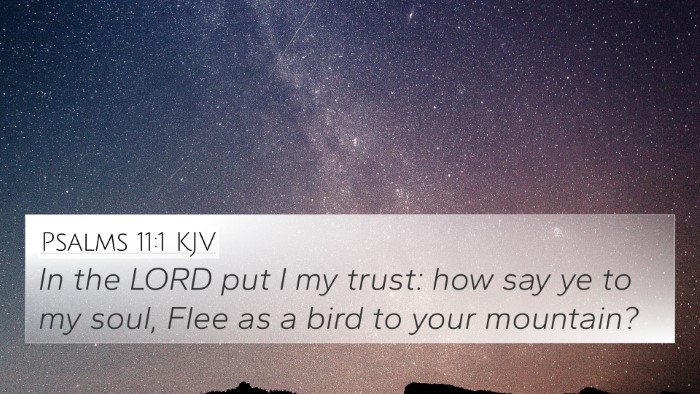Understanding Psalms 55:6
Psalms 55:6 states:
"And I said, Oh that I had wings like a dove! for then would I fly away, and be at rest."
This poignant verse reflects the deep feelings of longing and desire for peace amidst turmoil. By analyzing this verse through the insights of public domain commentaries, we can gain a richer understanding of its meaning and implications.
Contextual Background
The Psalm is attributed to David, who wrote it during a period of great distress, possibly relating to betrayal. This context is crucial as it highlights the emotional turmoil the author is experiencing.
Verse Meaning Explained
- Vivid Imagery: The imagery of "wings like a dove" illustrates a desire for escape from life's burdens. Doves are often symbolic of peace, suggesting that David seeks a return to tranquility.
- Flight as a Metaphor: Flying away signifies a wish to flee from problems rather than confronting them, hinting at the human tendency to avoid pain.
- Yearning for Rest: The phrase "be at rest" underscores a deep psychological need for peace—a common theme in the Psalms, reflecting the universal struggle against anxiety and fear.
Commentary Insights
Based on the insights from Matthew Henry, Albert Barnes, and Adam Clarke, we find several critical interpretations:
- Matthew Henry: He emphasizes David's emotional state and the weight of betrayal from friends. His plea for wings metaphorically represents his desire for freedom from sorrow.
- Albert Barnes: suggests that David's prayer for escape is indicative of a deeper spiritual yearning for communion with God, transcending his present troubles.
- Adam Clarke: highlights that this verse may point to the futility of attempting to escape rather than seeking solace in God's presence.
Connections to Other Bible Verses
This verse offers profound connections to numerous other scriptures, creating a web of thematic links:
- Psalm 42:1-2: "As the deer pants for streams of water, so my soul pants for you, my God." This reflects a similar yearning for spiritual satisfaction.
- Matthew 11:28-30: "Come to me, all you who are weary and burdened..." invites those in distress to find rest in Christ.
- Psalm 34:18: "The Lord is close to the brokenhearted and saves those who are crushed in spirit." This reinforces the theme of seeking refuge in God during pain.
- Isaiah 40:31: "But those who hope in the Lord will renew their strength. They will soar on wings like eagles..." which speaks to the future hope and strength found in God.
- Revelation 21:4: "He will wipe every tear from their eyes..." offers a promise of ultimate rest and peace.
- Philippians 4:6-7: Encourages believers to bring their anxieties to God for peace.
- Isaiah 55:8-9: "For my thoughts are not your thoughts, neither are your ways my ways." This reflects the notion that divine peace is often beyond human understanding.
- Psalm 61:2: "When my heart is overwhelmed: lead me to the rock that is higher than I." Similarity in seeking refuge from overwhelming feelings.
- 1 Peter 5:7: "Cast all your anxiety on him because he cares for you." Reminds us of God’s compassion amidst our struggles.
- Psalm 27:4: "One thing I ask from the Lord, this only do I seek: that I may dwell in the house of the Lord all the days of my life..." This verse speaks to the desire for closeness to God.
Applying the Insights
In our walks of faith, this verse and its connections emphasize the importance of seeking God's presence in times of distress. Here are some application points:
- Emotional Honesty: Acknowledging feelings of distress is a critical step towards healing.
- Seeking Solace in Scripture: Regularly meditate on verses that speak to God's comfort and peace.
- Prayer for Escape: While the desire to flee is natural, it is essential to bring these feelings to God in prayer.
- Community Support: Engage with fellow believers during turbulent times to share burdens and seek mutual encouragement.
Conclusion
Psalms 55:6 serves as a testament to the common human experience of longing for peace amid chaos. By understanding and connecting this verse with other scriptures, we can navigate our own struggles and find comfort in God’s promises. Embrace these thematic connections as you study the Bible, utilizing tools for cross-referencing and deeper study, which provide profound insights and spiritual applications.





